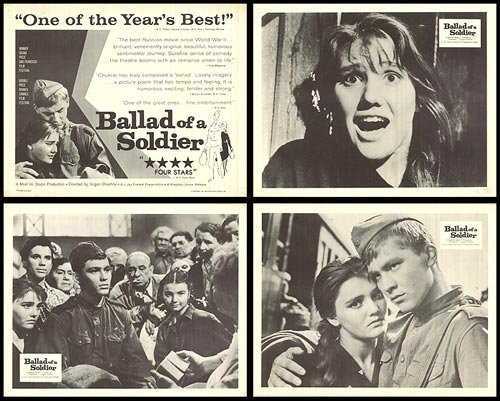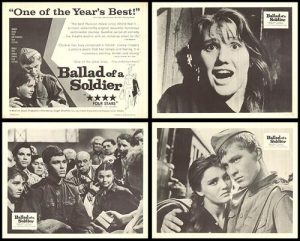Grading Historical Movies: Grigorii Chukhrai’s “Ballad of a Soldier” (1959)


Note: Students in Stephen Norris’s HST/FST 252, History at the Movies, are grading historical films and offering reviews on how assigned films render the past. The third film assigned in this Fall 2018 version of the course, which focuses on European films about World War II, was Grigorii Chukhrai’s 1959 Ballad of a Soldier.
Overall grade from 45 students: A-
Review One
By Stephan Koclejda
Grade: A-
Ballad of a Soldier is a brilliant, artful Soviet World War II film about a boy trying to just get home and Soviet society trying to cope with war. Filmed in 1959, Director Grigori Chukhrai beautifully and tragically captures and presents truths about the Soviet Union’s experience in the Great Patriotic war that propaganda films during the Stalin era tried so hard to hide. The result is an organic, authentic, quality piece of historical cinema.
The protagonist, Alyosha, is just a common soldier, a common grain-fed 19-year-old village boy when he performs a heroic deed while scared out of his mind fleeing from German tanks on the frontlines. Instead of a decoration, he asks for leave to go home and fix the roof for his mother – the film is a chronicle of his journey home. While stowing away on a train, he meets young Shura, a girl fleeing the war and its traumas. Together, these two children represent the two main facets of Soviet society during the war: the soldiers fighting and the civilians fleeing the war. Alyosha wants desperately to see his mother (perhaps a representation of the Soviet Motherland) and is a good person who goes out of his way to help others but will ultimately return to the front and carry out his duty defending his home. Shura is an orphan of the war, seeking something, anything to get her away from its traumas.
As Alyosha travels, he comes across several towns and characters dealing with the war. He helps a wounded man return to his wife, who the wounded man thought would not be there for him. He delivers a package to the wife of a soldier heading to the front, only to find that she’s having an affair. He meets the father of the same soldier, bedridden and worried about his son. Little white lies are told, as Alyosha tells the father great heroic things about his son who Alyosha doesn’t even know just to help the old man feel better. Everyone is merely trying to survive, to cope with the sufferings and harsh realities of the war in whatever way they can. A wife has an affair, a father is told a lie.
Ballad of a Soldier does not shy away from presenting these realities – this is no cheery propaganda narrative. Stalin is no unifying figure leading the Soviet Union and communism to great victory over German fascism: the man is never even pictured or mentioned in the film at all. The nation exists in a state of total war. Nothing will escape untouched – the land, the buildings, the people, nothing. The Great Patriotic War came at a horrific cost to the Soviet Union and the film makes it known. We learn in the first minutes of the film that Alyosha does not live to see the end of the war, which makes each scene of him helping create light in the darkness of war that much more tragic and sweet.
Review Two
By Paige Ross
Grade: A
Ballad of a Soldier artfully and subtlety captures the Soviet experience of World War II through the eyes of nineteen-year old private Alyosha Skvortsov, who requests leave in lieu of a decoration for his bravery destroying two German tanks, in order to visit is his mother and repair her leaking roof. On his journey home, Alyosha encounters the effects of war on the land and the people of his country. Through his eyes, the viewer gains a sobering picture of the grim and devastating realities of war in Soviet Russia. Alyosha meets a variety of people on his trip home including Vasya, a wounded soldier without a leg who is being discharged, Gavrilkin a tough-talking sentry who reluctantly allows Alyosha to board an army supply train, Shura a young girl supposedly trying to get home to her aunt, the dying father and unfaithful wife of fellow soldier Sergei Pavlov, and an elderly woman who drives Alyosha part of the way home. Through each of the characters he meets, Alyosha is able to see the true impact of war on the people of his country, and each character reveals a different aspect of war: physical injury, loneliness, fear, sadness, fatigue, etc. Perhaps one of the most telling and poignant moments in Ballad of a Soldier occurs in the film’s finale, which illustrates the senselessness of war and the death of possibility, future, and hope which occurs parallel. The narrator tells the viewer, “He [Alyosha] could have become a remarkable man. He could have become a builder or beautified the land with gardens. He was, and in our memory will forever remain, a soldier…a Russian soldier.”
Ballad of a Soldier manages to accomplish being a war film without being a “war film,” and utilizes the art of subtlety to make a greater, and perhaps more “truthful” statement about war. Rather than being a film filled with obvious violence, chaos, torture, and death, Ballad of a Soldier uses other less overt devices to help the viewer understand the devastating Soviet experience of World War II. In this sense, the film is masterful and perhaps even more powerful than other more “typical” war films. Additionally, the film makes a concerted effort to disprove and unravel earlier narratives presented in the propagandistic state under Stalin, such as Mikhail Chiaureli’s 1949 film The Fall of Berlin. Director Grigori Chukhari superbly integrates interesting and dynamic camera shots from beginning to end, which appear engaging to the viewer nearly sixty years later. Additionally, Chukhari’s choice of when and when not to include music in scenes is methodical and calculated, and further adds value and depth to the viewer’s overall experience. Taken as a whole, Ballad of a Soldier is a remarkable piece of film that powerfully, and softly, illustrates the lasting impact of the Second World War on Soviet Russia and its people.
Review Three
By Aleah Sexton
Grade: A-
Ballad of a Soldier, the 1959 Soviet film, proved to be a melancholic, humorous, and lovely drama. From the opening scene, the audience is made aware that the main character, the charming, brave, and attractive Red Army soldier – Alyosha – will not survive WWII. Due to this tragedy, the film has added suspense and viewers follow Alyosha’s journey home to simply say hello to his mother and fix their roof. This film provided the audience with an example of true nobility as they witness Alyosha when he pays tribute to the Motherland by helping Russia’s people along the way. This film beautifully portrayed how war affects life beyond the trenches and the cultural responsibility that is carried among each regular citizen.
Following Robert Rosenstone’s thesis of historical films, Ballad of Soldier should be understood as a dramatic feature film, mainly because of the ability to “aim directly at the emotions”. It goes beyond giving us a simple description of the past and instead, “it wants you, the viewer, to experience the hurt (and pleasures) of the past”. Chukhrai brilliantly uses his camera to zoom in on the character’s faces during intense scenes, orchestrating the music to compliment the emotion, and engaging with the audience through the entirety of the film by adding humor. Through all of this, the viewers are left with an intense film that produces an emotional response to the love and loss that the characters endure. Out of all the films the audience has watched for the class, I believe Ballad of a Soldier stands as the one with the most climatic idealism. Alyosha is the accolade of the Russian propaganda of the perfect, obedient soldier and his bravery is unmatched. However, his death adds a bit of risk on Chukhrai’s end because it proves that all of the war’s heroes are also just simply people. Stalinist propaganda is absent in the film. Instead, Chukhrai focuses on the humanistic aspects of war. The metaphoric truth he conveys is evident: Alyosha’s death reveals the true cost of war. The viewers are connected to his charming character and in the final scene when he waves goodbye to his mother for the last time we truly feel the cost of war.